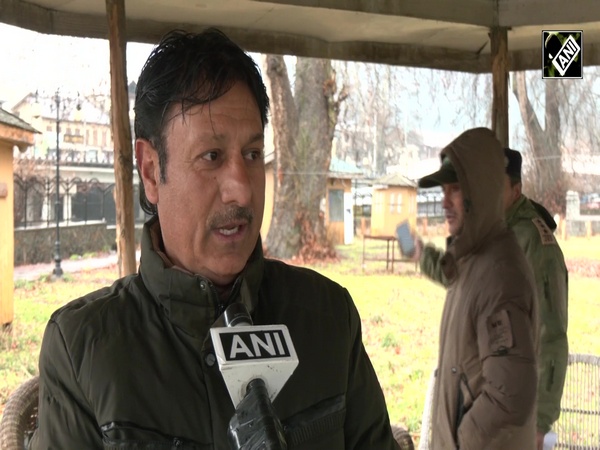China and Russia in strategic marriage of convenience
Feb 08, 2022

Hong Kong, February 8 : Russia and China are enjoying a confluence of aims, as the former eyes political control over Ukraine, and the latter dreams of conquering Taiwan. Along the way, they both relish the prospect of giving the USA comeuppance.
Strengthening ties between Moscow and Beijing were underscored by a meeting on 5 February, when President Vladimir Putin met Chairman Xi Jinping during the Winter Olympics, their first face-to-face meeting in more than two years. The China-Russia Comprehensive Partnership of Coordination for a New Era was agreed on 5 June 2019, when Xi visited Putin. That was his eighth visit to Russia since 2013, underscoring closer ties between the two strongmen.
Naturally, China will not want Russia to invade Ukraine while the Beijing Olympics are running. These Olympics represent one of two pinnacles for 2022 for the Chinese Communist Party, and it wants nothing domestically or internationally to detract from its moment in the spotlight.
This is illustrated in the fact that the People's Liberation Army (PLA) temporarily paused provocative flights into Taiwan's air defense identification zone. On 23 January, these flights had peaked at 39 in a single day. However, one can be certain these flights will resume as
soon as the Olympics conclude.
Russia is unlikely to upset China by militarily moving against Ukraine during this sporting event. It would unduly antagonize China, at a time when both need mutual support. Although Russia invaded Georgia just one week before the Beijing Olympics in 2008, it is unlikely to act this way again in regards to Ukraine.
Some commentators posit that a conflict in Ukraine would be to China's advantage. Ryan Hass, a senior fellow at the Brookings Institute in Washington DC, begs to differ, however.
Nonetheless, he did admit, "Yes, a conflict in Ukraine could temporarily divert American strategic focus, reducing pressure on China. Yes, it would make Russia more dependent on China, thus giving Beijing greater leverage in its relations with Moscow. Yes, senior Chinese officials are parroting some of Moscow's favorite talking points (e.g. the US and the West need to drop their 'Cold War mentality', the US should not pursue security at Russia'sexpense, etc.). Beijing will not do the US any favors."
Conversely, Hass noted that "China's focus this year is on the Olympics and Party Congress. Beijing wants stability and predictability. They will not welcome foreign turbulence. Unsurprisingly, Chinese officials are calling for steps to lower tensions and implement the
Minsk agreement."
Thus, Chinese Ambassador Zhang Jun addressed a United Nations Security Council open meeting on Ukraine on 31 January: "China once again calls on all parties concerned to remain calm, not to do anything to aggravate tensions or hype up the crisis, and to properly resolve their differences through consultations on an equal footing on the basis of mutual respect and fully taking into account each other's legitimate security concerns."
Yet Zhang leaned heavily on Russia's side. "NATO is the product of the Cold War, and NATO expansion epitomizes bloc politics. We believe that the security of one country should not be achieved at the expense of the security of other countries. Still less should regional security rely on strengthening or even expanding military blocs. Today in the 21st century, all parties should completely abandon the Cold War mentality and come up with a balanced, effective and sustainable European security mechanism through negotiations, with Russia's legitimate security concerns being taken seriously and addressed."
As can be seen, Beijing's Foreign Ministry has issued tame comments over the threat of war in Ukraine. Chinese sentiments are clearly sympathetic to Russia, and Beijing is happy to blame the USA and NATO for the current impasse.
Hass further argued why war is not in Beijing's interests: "Chinese officials recognize that Beijing will be found guilty by association if Russia invades Ukraine after Putin's meeting with Xi. China will suffer significant reputational damage, especially in Europe and the US, for being seen as Russia's enabler."
This line of thinking was echoed by US National Security Adviser Jake Sullivan.
He told the NBC: "We believe that Beijing will end up owning some of the costs of a Russian invasion of Ukraine, and that they should calculate that as they consider their engagements with the Russian government over the next couple of weeks ... If Russia does choose to move
forward, not only will it come at a strategic cost to Russia, but if China is seen as having supported it, it will come at some costs to China as well, in the eyes of the world, in the eyes of Europe and in the eyes of other countries who are looking on now and sending a clear message that they would prefer to see diplomacy over war."
It could be countered that China is already acting imperiously in ways that antagonize, and that it has already shown willingness to pay a price. In the South China Sea, in its relations with Taiwan, its "wolf warrior diplomacy", its subjugation of Hong Kong and imprisonment
of more than a million Uyghurs in Xinjiang, Beijing is prepared to spurn public opinion when it comes to its core interests.
Hass made another point: "A Russian invasion likely would not do Beijing any favors on Taiwan. Conversely, it could cause the US to show greater strength in the Pacific so that China doesn't draw any wrong lessons from Putin's incursion, perhaps a bit akin to events at the start of the Korean War. A Russian invasion also could generate negative consequences for Chinese hi-tech companies, particularly if Russia gets designated with foreign direct product rules, and Chinese firms are swept up in US secondary sanctions and lose access to Western equipment and investment."
When an American journalist asked Jake Sullivan about the Taiwan implication, he replied that "the United States is going to take every action that we can take, from the point of view of both deterrence and diplomacy, to make sure that the Taiwan scenario you just described never happens".
Nonetheless, Xi must see parallels between Russia's claims on Ukraine and his "ownership" of Taiwan. Ukraine therefore forms a timely case study on the cost-benefit of any future military action against Taipei. An attack by Putin will act as a barometer of potential consequences for China, whether it be Western countermeasures, sanctions or the fallout on Russia's economy.
In Europe, China will be keen to see whether American security guarantees are discredited and whether international faith in American resolve wavers. If the USA does nothing to thwart Putin, then perhaps the lesson it will take is that Washington DC will be similarly timid in Asia. If China's neighbors doubt American determination, then China will be able to bully its neighbors even more than before.
The USA is aware of this. Marco Rubio, the US senator for Florida, warned: "If Putin is able to move into Ukraine, take on a few sanctions and some international condemnation, but ultimately, not pay a terrible price, it doesn't just impact Ukraine, it becomes the model that China, Iran, North Korea and the other rogue governments around the world will follow."
Taiwanese retired admiral Lee His-Min, a senior fellow at the Project 2049 Institute, concurred: "China is watching very, very closely, there's no doubt about that. No matter the results of the Ukraine [confrontation], I don't think there will be an immediate full-scale invasion of Taiwan, but if they find out that this salami-slice tactic works for Russia, they may try to take one of Taiwan's offshore islands."
Xi refuses to renounce the potential use of force against Taiwan, threatening to take "all necessary measures" to "smash" any moves towards Taiwanese independence. One important difference is that Ukraine is not a NATO member, and so the organization is not obliged to come to Kyiv's rescue. On the contrary, the USA is committed via its Taiwan Relations Act and, in October 2021, Biden promised the USA would help defend Taiwan if China ever attacked.
There has even been speculation that China and Russia would mount a coordinated dual attack, one into Ukraine and the other against Taiwan. However, this is far-fetched. There has been no observable build-up of PLA units near Taiwan, like there has been of Russian units near the Ukrainian border.
Another thing to bear in mind is that China also maintains good relations with Ukraine, buying foodstuffs and other equipment as Ukraine's top trading partner. Just last month, Xi sent a congratulatory letter to President Volodymyr Zelensky.
Hass thus concluded, "...China is in a diplomatic jam. It would face difficulties and unwelcome turbulence from a conflict in Ukraine, but at the same time it wants to preserve strong relations with Russia and it does not want to do the US any favors."
Bonnie Glaser, director of the Asia Program at the German Marshall Fund of the USA, agreed with Hass's comments, but added, "Yet, if China overtly sides with a Russian invasion of Ukraine and helps mitigate the impact of Western sanctions, it will reveal volumes about Xi Jinping's worldview, ambitions and priorities."
A major war in Eastern Europe would drag down China's yearly growth target of 5.5-6%. It would also cause oil and gas prices to spike, something problematic for China given that it is the world's largest crude importer. European countries are wary of Russia; if China is seen to be backing Moscow, they will be forced deeper into NATO's embrace. This will impinge upon China's efforts to enlarge market shares in these countries.
Militarily, China and Russia have grown closer together strategically, in cooperative mechanisms and in practical ways. China has bought Russian equipment such as S-400 air defense systems and Su-35 fighters, and Russia is assisting China to create a ballistic missile defense network and develop a heavy-lift helicopter.
At the ministerial and Central Military Commission level, the two militaries communicate regularly. Despite COVID-19, joint exercises have been conducted, such as Xibu Unity 2021 in China, the Shanghai Cooperation Organization's Peace Mission counterterrorism exercise, the International Army Games 2021 and Joint Sea 2021.
John Van Oudenaren wrote for The Jamestown Foundation: "As Russian troops mass on the Ukraine border and the odds of a major war in Eastern Europe mount, Xi faces a complex dilemma. On the one hand, he has an immediate interest in avoiding a major international crisis that could destabilize the global economy, and undermine his domestic political position in a critical year. However, he also recognizes an abiding strategic interest in sustaining and deepening the Sino-Russian partnership, which is far more viable if Russia and the West remain at permanent loggerheads. In order to reconcile these two conflicting interests, Beijing has advocated for a diplomatic solution to the ongoing crisis, while simultaneously supporting Moscow's assertion of privileged security interests in Eastern Europe."
Another interesting geopolitical dynamic is occurring too, with a China-Pakistan-Russia triangle developing.
Whilst Putin was the first leader that Xi hosted personally after the Olympics opening ceremony, he met with Pakistan Prime Minister Imran Khan too. Their joint statement issued on 6 February reaffirmed their "close strategic ties and deep-rooted friendship," and they "reiterated their support on issues concerning each other's core interests" (e.g. China's stance on Taiwan, the South China Sea, Hong Kong, Xinjiang and Tibet).
Both nations reaffirmed their support for the China-Pakistan Economic Corridor, of which Gwadar is a "central pillar". They will jointly accelerate construction and operation of Gwadar port. They also promised closer defense and security cooperation.
Most interestingly, Khan will be in Moscow later this month, the first time a Pakistani leader has conducted such a visit to Russia in 23 years. By contrast, President Joe Biden is still yet to speak to Khan after assuming the presidency.
This could mark the beginning of a regional realignment for Pakistan. As Derek Grossman, a senior defense analyst at the RAND Corporation, observed, "Pakistan's deep ties with China are lubricating Pakistan-Russia ties. I fully expect a Russian presidential visit to Pakistan
soon. Growing China-Russia alignment has geostrategic consequences."
Putin is often thuggish in the way he acts - as typified by military escapades in Georgia and the Crimean Peninsula. China tends to be more nuanced, practicing brinkmanship with distinctive Chinese characteristics. One of those ways, as the ancient strategist Sun Tzu advised, is that it is better to "win without fighting". Hence, part of Beijing's modus operandi has long been a psychological one, where it wants others to believe that resistance is futile.
















